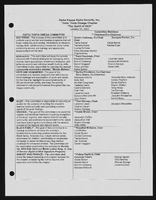Search the Special Collections and Archives Portal
Search Results
Edgar Flores (Nevada Legislature, Assemblyman) oral history interview conducted by Magdalena Martinez and Facundo Bentancourt: transcript
Date
Archival Collection
Description
From the Lincy Institute "Perspectives from the COVID-19 Pandemic" Oral History Project (MS-01178) -- Elected official interviews file.
Text

Alpha Kappa Alpha Sorority, Theta Theta Omega Chapter list of committees
Date
Archival Collection
Description
From the Alpha Kappa Alpha Sorority, Incorporated, Theta Theta Omega Chapter Records (MS-01014) -- Chapter records file. Includes committee responsibilities, members, and chairs.
Text

Transcript of interview with Betsy Fretwell by Claytee White and Stefani Evans, August 30, 2016
Date
Archival Collection
Description
Shortly before the University of Georgia granted Betsy Fretwell Master's degree in public administration in 1991, she applied for a one-year internship with Clark County, Nevada. The County hired her, but Fretwell did not complete her internship. Instead, the County promoted her, hired her full-time, and soon had her lobbying for the County's interests in Carson City. Her insistence on learning all sides of a question and communicating that knowledge to the decision makers was one of the skills that made her so valuable to Clark County administrators. In this interview, Fretwell discusses her South Carolina childhood, her affinity for the University of Georgia Bulldogs, and the path she took to occupy the office of city manager for the City of Las Vegas. She talks about her years at Clark County and a term at the City of Henderson, but she mostly focuses on her sixteen years at the City of Las Vegas, first as assistant city manager under Virginia Valentine and later as city manage
Text

Chelsie Campbell interview, January 9, 2019: transcript
Date
Archival Collection
Description
Chelsie Campbell is a Cuban-American attorney and lobbyist. Born on October 4, 1979, Chelsie is a native Nevadan and grew up in Las Vegas. Her mother, Norah Campbell, came to Las Vegas after the Cuban Revolution and works as an elementary school teacher. Her father, Alan Campbell, was a former teacher and hotel manager. An advocate for the Latino community, Chelsie has dedicated her life to advocacy. Her involvement began at UNLV where she found her voice through the Student Organization of Latinos (SOL). During her time with SOL, she advocated for the elimination of the social security requirement in UNLV’s admission process and lobbied for the retraction of Las Vegas Review Journal’s racist article on Latino students. Her activism in SOL also helped established additional SOL chapters across Las Vegas high schools and at the College of Southern Nevada. After earning her Bachelors in Broadcast Journalism and Spanish Literature from UNLV, Chelsie attended William S. Boyd Law School where she graduated in 2005. Chelsie also attended University of Nevada, Reno where she received her master’s in Management and a graduate certificate in renewable energy. Chelsie worked for Mach One Group as Editor-In-Chief of its two publications, Nevada Family Magazine and La Familia de Nevada. After law school, Chelsie began working at NV Energy as a spokesperson and worked her way up to government affairs. Chelsie is currently working as an independent lobbyist and choses her clients. Her clients include Clark County School District and NV Energy. Her work as a lobbyist includes helping agencies prepare for Nevada’s legislative session, conduct public policy research, and help with educational outreach. Through her activism, Chelsie has worked for former Senate Majority Leader, U.S. Senator Harry Reid. Chelsie is also part of the inaugural class of Emerge Nevada, a political leadership-training program for women in Nevada. Chelsie is on the Board of Trustees for the Leukemia and Lymphoma Society of Southern Nevada, the Chairwoman for the Nevada Advisory Board for CPLC Southwest, Board Member for the Advisory Commission on law-related Education for the State Bar of Nevada and serves on the Governmental Affairs Committee for the Latin Chamber of Commerce. She is the former President for the Boyd Law School Alumni Chapter and the Board of Directors for the Gray Plunkett Jydstrup Living Facility. Chelsie would like to dedicate her oral history to her parents: Without them, I wouldn’t be here.
Text

Eddie Escobedo interview, February 25, 2019: transcript
Date
Archival Collection
Description
Interviewed by Maribel Estrada Calderón. Claytee White also participates in the questioning. Eddie Escobedo was born in 1961 and two years later, he and his family immigrated to the United States. He fondly remembers his father, Edmundo Escobedo. Escobedo is currently in charge of the newspaper that his father started, El Mundo Newspaper.
Text

Nora Mirabal interview, August 30, 2019: transcript
Date
Archival Collection
Description
Interviewed by Elsa Lopez and Barbara Tabach. Cuban refugee family by way of Spain and then to the US; arrived in Las Vegas in 1973 when Nora was 9 years old. Struggled in youth but rises up as embraces educaton. Currently is Assistant Director of Academic Partnership at CSN.
Text

John Robinson Pacheco interview, June 24, 2019: transcript
Date
Archival Collection
Description
Interviewed by Laurents Bañuelos-Benitez. John Pacheco's father, Francisco, arrived in Las Vegas in 1942. John was born in 1947 and raised mostly on 27th Street. He is a graduate of Rancho High School and UNLV. He is a retired artist known for hand-painting signage for many local businesses. As a very civic minded person, John has received many local awards and served on committees for the Las Vegas Chamber of Commerce, East Las Vegas community, and much more.
Text

Transcript of interview with Paul Huffey and Michael Mack by Claytee White, February 2, 2010
Date
Archival Collection
Description
Whenever Paul Huffey drives through John S. Park Neighborhood he visualizes his youth and the times he spent with his childhood friend Michael Mack, who joined in this interview. Together they reminisced about their teen years in the 1950s and living in John S. Park Neighborhood. Paul's first home was Normandie Court, the first authentic motel in Las Vegas. In 1947, Paul's father purchased a lot on Paseo Park and built a home for his wife and only child. He describes life in that home as idyllic: no war or unemployment issues, a time when the Strip was "meaningless" unless you had a parent working there. An era when mothers, at least in his neighborhood, were stay-at-home moms and children freely roamed on their bicycles. Of their teen years, Paul and Michael recall their hi-jinks, discovering beer, and admiring pretty girls. In 1956, he graduated from Las Vegas High School, enlisted in the U. S. Army Reserve and enrolled in University of Nevada Reno. He taught history at Basic High School in Henderson for nine years.
Text

Transcript of interview with Catherine Hunt by Dennis Hunt, March 2, 1980
Date
Archival Collection
Description
On March 2, 1980, Dennis Hunt interviewed his mother, Catherine Hunt (born August 25, 1932 in Palmyra, Missouri) about her life in Southern Nevada. The two discuss Catherine Hunt’s work as a secretary before becoming a housewife. The interview concludes with Catherine Hunt’s thoughts on population growth, women’s rights, and the Equal Rights Amendment.
Text

